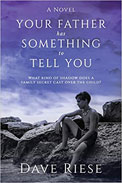
 |
Mark returns to Massachusetts from Chicago-land on short notice and during a stressful work period to visit sick parents. He and his sister worry they've started drinking again, a habit they promised their kids years ago that they had quit for good. After the visit, when Mark is passed over for a promotion, he finds new work around Boston. As his parents deteriorate over the next few years, Mark laments the dwindling time he has with them and revisits haunting childhood memories.
The opening scene sets the novel's stressful tone. Boston bustle, hectic schedules, and chaotic healthcare atmospheres create a harried background in which subsequent chapters delve into moments showing the aging process. Watching his mom experience a series of falls, Mark returns to moments of insecurity from childhood in which he kept secrets. He tells stories about regrets stealing and cheating as a kid. He recalls his embarrassment of trying to buy cigarettes for his mom. His dad's harsh treatment of him causes him to doubt his love. The frequent back and forth between time periods illustrates the fraught connections between past and present.
Alongside the string of heavy memories, dedicated familial bonds are forged through candid dialogue. Some conversations about race between relatives show cultural shifts. Dramatic confessions by Mark's dad and the unveiling of his mom's family scandal fill out Mark's impressions of his parents and resolve some mysteries in his life. Details describing care facilities, hospitals, and homes keep the story realistic and down to earth. The articulation of feelings is sincere and balanced. Depictions of growing up in the 1960s evoke the color and emotion of the time. These and present-day scenes come together in an even-paced (if anticlimactic) plot. Easy-to-relate-to characters elucidate universal conundrums for a compassionate and cathartic read.